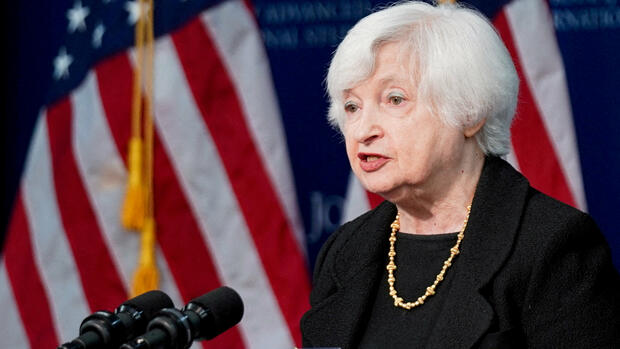Washington The trip to China by US Treasury Department Janet Yellen was actually supposed to start on a positive note. She is visiting Beijing this Thursday, Friday and Saturday, where she will meet Chinese Deputy Prime Minister He Lifeng, among others.
Shortly before departure, Yellen underscored the importance of “responsible bilateral relations”. The world’s largest economies could “work together on global challenges,” she promised. US Secretary of State Antony Blinken flew to Beijing just two weeks ago, ending months of radio silence on both sides.
But the dispute between the superpowers over future technologies, raw materials and dominance over the global chip industry escalated around Yellen’s journey of all things. The most recent escalation raises the question of whether the US and China still have a pragmatic working relationship at all – as Yellen suggests.
Beijing announced on Monday that it would introduce export controls for two important industrial metals. From August, the metals gallium and germanium should only be exported with a license. The restrictions come in response to US efforts to ban China from Western high-tech industries.
China is the world’s largest producer of gallium and germanium. The metals are required in the semiconductor, telecommunications and electric vehicle industries. Europe is also dependent on deliveries from China.
The trade war between the US and China has been worrying experts for some time. “The rising geopolitical tensions are increasing the risk of economic fragmentation, particularly in the areas of trade and technology,” the International Monetary Fund warned in the spring.
More on the subject:
The think tank Eurasia Group spoke of a “warning shot, not a deathblow” because the export controls are limited to two metals. But the decision serves a clear purpose: “Beijing reminds the United States, Japan and the Netherlands that retaliation can be taken at any time.”
In January, China sanctioned the US arms manufacturers Lockheed Martin and Raytheon and launched an investigation into the US chip manufacturer Micron. The export controls that have now been announced are seen in Washington as the next step in a possible series of retaliations.
Strike After Strike: The Superpowers’ Trade War
The United States and China have grown ever further apart in recent years. Five years ago to the day, Donald Trump’s government at the time imposed punitive tariffs on Chinese imports worth more than $300 billion. His successor, Joe Biden, maintains the tariffs to this day.
Biden has placed demarcation from China at the heart of his presidency – and his campaign, as he seeks re-election to the White House in 2024. The US President is boosting domestic chip and battery production with billions in subsidies in order to make the USA less dependent on Chinese raw materials, chips and batteries.
China accounts for more than 60 percent of the world’s total rare earth production, nearly four times that of the United States. China dominates the supply chains for rare earths, used in many high-tech products, and lithium, cobalt and graphite, used in batteries.
Last year, the US government imposed sweeping export controls on China to slow Beijing’s technological and military advances. The Netherlands and Japan joined the US.
In the future, even the flow of capital between the two largest economies should no longer flow unhindered. The White House wants to introduce controls for foreign investments, so-called outbound investment screenings.
Yellen keeps an eye on the global economy
Finance Minister Yellen is seen as a pragmatist on China issues. In a widely acclaimed speech in May, she called for dialogue with China. Economically, one could work constructively with China, she explained at the time. “We can find a way if China is also willing to play its part.”
As finance minister, Yellen must have a focus on global economic growth and financial sector stability, which explains the balancing tone.
But there are many China hawks in the Biden cabinet: Economy Minister Gina Raimondo and Trade Representative Katherine Tai are responsible for ensuring that Chinese companies in the tech sector are sanctioned.
And Biden’s national security adviser Jake Sullivan even sees competing with China and strengthening one’s own industrial base as a “question of survival”.
Washington could soon respond with new sanctions of its own. According to the Wall Street Journal, the Biden administration is considering tightening restrictions on the export of cutting-edge AI technology to China. Cloud providers such as Amazon and Microsoft will also be required to obtain US government approval before becoming service providers for Chinese companies.
USA to build first processing plant for rare earths
In the dispute over rare earths and minerals, the USA should not change course. Because the global race for raw materials is also seen as a lucrative opportunity to develop new business models.
The first processing plant for rare earths and critical minerals in the USA is currently being built in the American state of Oklahoma. So far, processing has taken place entirely outside of the USA.
From 2024, the company “USA Rare Earth” wants to produce magnets made of rare earths, which are needed for the automotive and EV industry, but also for turbines and the defense industry.
“The dependency of our value chains will become increasingly clear over the next ten years,” CEO Tom Schneberger told Handelsblatt. “We are taking action right now to prevent that from happening. The US and Europe need strong, stable and diversified supply chains to secure their national interests,” said Schneberger.
Not all of the minerals that USA Rare Earth wants to process will come from the US, some of which would be imported. “But I can promise one thing: they will not come from China one hundred percent.”
More: “Highest growth rate in the world” – Biden celebrates the US boom
